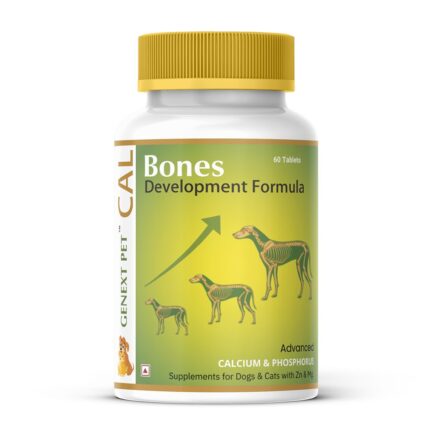The Ultimate Guide to Joint Health in Pets: How to Keep Your Dog and Cat Active & Pain-Free

Joint health plays a crucial role in your pet’s overall well-being. As dogs and cats age, they can develop joint stiffness, mobility issues, and arthritis, making everyday activities like running, jumping, or climbing stairs more difficult. While some joint wear and tear is natural, early prevention and proper care can significantly improve your pet’s quality of life.
In this guide, we’ll explore the importance of joint health, key risk factors, early warning signs, and the best ways to support your pet’s mobility through nutrition, exercise, and supplements.
Understanding Joint Health in Pets
How Do Joints Work?
Joints are the connecting points between bones, allowing for movement. They contain cartilage, synovial fluid, and ligaments, which provide cushioning and prevent bones from rubbing against each other. Over time, due to aging, injuries, or breed predisposition, this cushioning can wear down, leading to pain, inflammation, and reduced mobility.
Common Joint Issues in Dogs & Cats
- Osteoarthritis (Degenerative Joint Disease) – A progressive condition that causes cartilage breakdown, leading to pain and stiffness.
- Hip Dysplasia – A hereditary condition where the hip joint doesn’t fit properly, common in large-breed dogs.
- Elbow Dysplasia – Abnormal development of the elbow joint, leading to discomfort and lameness.
- Luxating Patella (Kneecap Displacement) – Often seen in small-breed dogs, causing the kneecap to move out of place.
Did You Know? Certain breeds like Labradors, German Shepherds, Golden Retrievers, and Bulldogs are more prone to joint issues due to their genetics and body structure.
Signs Your Pet May Have Joint Problems
Pets are experts at hiding pain, so recognizing early warning signs is essential. Look out for:
- Limping or favoring one leg
- Difficulty getting up or lying down
- Reluctance to jump, run, or climb stairs
- Swollen joints or sensitivity when touched
- Stiffness after resting
- Reduced playfulness or energy levels
If you notice these signs, consult a veterinarian for an early diagnosis and treatment plan.
How to Maintain Healthy Joints in Pets
1. Keep Your Pet Active
Regular exercise strengthens muscles, supports joint flexibility, and prevents stiffness.
- Low-impact activities like swimming and walking are excellent for pets with joint concerns.
- Avoid high-impact exercises (like jumping on hard surfaces) for breeds prone to hip or knee issues.
Tip: Engage your pet in daily movement—even a few short walks can help maintain joint health!
2. Provide a Balanced Diet
Nutrition plays a major role in joint support and inflammation reduction.
- High-quality protein helps maintain muscle strength, reducing stress on joints.
- Omega-3 fatty acids (from fish oil) help lower joint inflammation.
- Maintain a healthy weight—excess weight puts additional stress on the joints, worsening mobility issues.
Fact: Overweight pets are four times more likely to develop arthritis than those at a healthy weight!
3. Incorporate Joint-Supporting Supplements
Veterinary-approved joint supplements can significantly improve mobility and reduce discomfort.
Key Ingredients to Look for:
✔ Glucosamine & Chondroitin – Helps repair cartilage and prevent further joint damage.
✔ Hyaluronic Acid – Maintains joint lubrication for smooth movement.
✔ Boswellia & Curcumin (Turmeric Extract) – Natural anti-inflammatory agents that relieve joint pain.
✔ Omega-3 (EPA & DHA) – Supports joint flexibility and reduces stiffness.
How Genext Pet’s GluMaxx Can Help
If you’re looking for an effective, vet-formulated joint supplement, GluMaxx Joint Support is a great choice. It contains Glucosamine, Chondroitin, MSM, and Omega-3s, all working together to support mobility and relieve joint pain in both dogs and cats.
[Check Out GluMaxx Here]
4. Create a Joint-Friendly Home
- Use soft bedding to reduce joint pressure while sleeping.
- Provide ramp access for senior pets to climb onto furniture or get into the car easily.
- Keep food and water bowls at a comfortable height to avoid straining the neck or joints.
Tip: For pets with arthritis, heated pet beds can help soothe stiff joints and improve circulation.
Final Thoughts: Invest in Your Pet’s Joint Health Today
Maintaining strong, pain-free joints is essential for your pet’s happiness and longevity. Whether your pet is young, active, or aging, proactive care through nutrition, exercise, and supplements can make a significant difference.
Want to give your pet the best joint support?
Explore Genext Pet’s vet-approved joint care supplements for stronger, healthier joints![Shop Joint Supplements Now]
About Author
Dr. Kevin Modi
Dr. Kevin Modi is a trusted voice in the Indian pet care space, with years of hands-on experience in pet wellness, gut health, and natural supplements. At GenextPet, he guides product formulation and ensures content accuracy, drawing from real-world insights and the latest research. His goal? To simplify pet health for every dog and cat parent.

